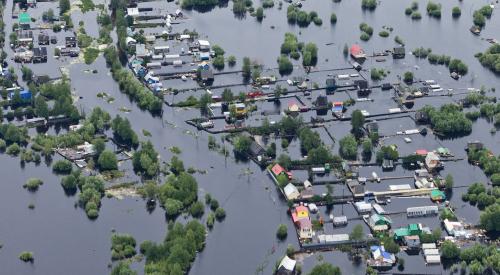Hazard Mitigation Provisions in Codes Save Lives and Protect Property
A new National Institute of Building Sciences study on hazard mitigation found that updated building codes produce significant benefits. The NIBS report found that adopting the 2018 International Codes (I-Codes) generates a national benefit of $11 for every $1 invested and saves lives. The I-Codes are the most widely used and adopted set of building safety codes worldwide.
The national mitigation benefit-cost ratio associated with code adoption is $6 to $1 for floods, $10 to $1 for hurricanes, and $12 to $1 for earthquakes. The quantified benefits are the result of avoided injuries and deaths, reduced post-traumatic stress, lower property damage, fewer business interruptions, and reduced insurance premiums.
Communities that consistently meet the latest editions of the I-Codes have added 30,000 new jobs to the construction-materials industry. The NIBS report also found that adoption of the 2015 International Wildland Urban Interface Code provided a $4 to $1 mitigation benefit against wildfire risk.
First Resilience Benchmarks for U.S. Communities Released
First-of-their-kind resilience benchmarks for U.S. communities that can be used to evaluate the current state of resilience and guidance for areas of improvement have been released. The benchmarks, developed by the International Code Council and the Alliance for National and Community Resilience (ANCR), consist of nine requirements aimed at increasing the resilience of communities, including the adoption, administration, and enforcement of building codes. The benchmarks encourage local governments to adopt building codes and to provide the human, technical and financial resources necessary to support permitting, plan review, and inspections.
“A holistic approach to identifying and incorporating resilience measures into a community’s building stock, including the adoption of the latest building codes, supports the mitigation of damage from natural disasters and increases the overall resiliency of our communities,” said ANCR Executive Director Ryan Colker in a news release. “These benchmarks provide a standard for local and state governments to follow ensuring they are well prepared for the next disaster.”
State and local government officials contributed to the development of the buildings benchmarks, including representatives from the Virginia Department of Housing and Community Development and the New York City Department of Buildings. Representatives from across the building industry, including designers, manufacturers, trade groups and nonprofits, were also involved in the development of the benchmarks.
Homebuilders Warn of Higher Costs after Net-Zero Standard Announced in British Columbia
Home builders in British Columbia, Canada are warning that new building standards mandating that new homes be made net-zero energy ready by 2032 will add significant costs. A study by the Canadian Home Builders’ Association found that such homes would incur $78,000 in additional costs.
The province has developed the plan, but cities will decide how it is implemented. They could adjust codes according to neighborhood or housing type or size, said a Kamloops city official.
Homeowners in Florida County Face Higher Code Standards after Hurricane Michael
Homeowners rebuilding in floodplains in Bay County, Florida face stricter code standards as they rebuild after Hurricane Michael. Some must raise their foundations if hurricane damage repair costs exceed a certain threshold.
County officials say the extra regulations are needed so homeowners can retain access to affordable federal flood insurance. About 104,000 people live in floodplains in the county, which includes Panama City.
U.K. City Reverses Course on Tiny House Ban to Create Affordable Housing
The British city of Bristol, which had banned tiny homes, has reversed its decision after a proposal for one was linked to solving an affordable housing crisis. The proposed modular tiny home to be built in the garden of a traditional terraced property could be a model for creating more housing in limited spaces, city councilors said.
In a related development, the Welsh government recently released a new planning policy that includes the creation of a register of smaller pieces of land where homes could be built. It also aims to simplify rules to speed up housing development.













